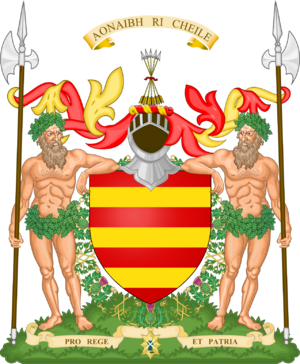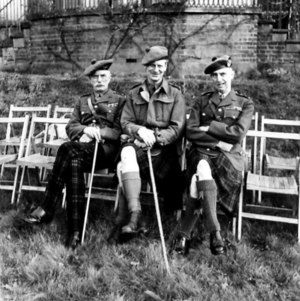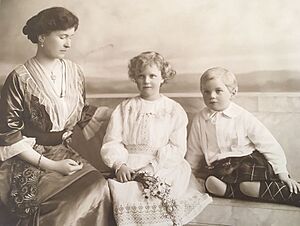Donald Walter Cameron of Lochiel facts for kids
Quick facts for kids
Sir Donald Cameron of Lochiel
|
|
|---|---|

The Master of Lochiel, ca. 1899
|
|
| Lord Lieutenant of Inverness | |
| In office 1939–1951 |
|
| Preceded by | Alfred Mackintosh |
| Succeeded by | The Lord Macdonald |
| Personal details | |
| Born | 4 November 1876 Dalkeith Palace, Midlothian, Scotland |
| Died | 11 October 1951 (aged 74) Inverness, Scotland |
| Spouse |
Lady Hermione Graham
(m. 1906) |
| Children | 5, including the 26th Lochiel |
| Parents | |
| Military service | |
| Rank | Colonel |
| Unit | |
| Battles/wars | |
Sir Donald Walter Cameron of Lochiel (born November 4, 1876 – died October 11, 1951) was an important Scottish leader. He was a high-ranking officer in the British Army, serving in two major wars. He was also the 25th chief of the famous Clan Cameron.
Lochiel started his army career during the Second Boer War. Later, in 1914, he was asked to create new army groups for World War I. He became a Colonel and led his regiment, the Queen's Own Cameron Highlanders. The many soldiers lost in the war deeply affected him.
After the war, he went back to his family lands in Lochaber, Scotland. He was interested in sheep farming and managing the land. He also strongly supported the Gaelic revival, which aimed to bring back the Scottish Gaelic language and culture.
Early Life and Education
Donald Walter Cameron was born at Dalkeith Palace in Scotland. He was the oldest son of Donald Cameron, who was the 24th chief of Clan Cameron. His mother was Lady Margaret Montagu Douglas Scott.
He had three younger brothers: Ewen, Allan, and Archibald. Sadly, two of his brothers died during the First World War. Donald went to Harrow School and then studied at the Royal Military Academy Sandhurst, which is a famous army training school.
His Military Career
Donald Cameron joined the Grenadier Guards as an officer in 1896. He became a lieutenant in 1898. He served in South Africa during the Second Boer War from 1899 to 1900. During this time, he helped in the Siege of Kimberley and was hurt at the Battle of Belmont.
He returned home in 1902 and was promoted to Captain. In 1914, when World War I began, a top army leader, Field Marshal Herbert Kitchener, asked Lochiel to create several new groups of soldiers. Lochiel agreed, but only if he could be their Colonel.
One of these groups, the 5th Service Battalion, fought bravely in France. His brothers, Allan and Archibald, also served in the army and were killed in the war. The loss of his brothers and many other soldiers under his command made Lochiel very sad.
Later Life and Leadership
From 1920 to 1936, Lochiel worked as an aide-de-camp for King George V. This meant he was a personal assistant to the King. He was made a knight in 1934, which gave him the title "Sir."
From 1939 until he died in 1951, he was the Lord Lieutenant of Inverness-shire. This was a special role where he represented the King in the Inverness area of Scotland. During World War II, he also led the local Home Guard in Inverness.
Lochiel loved Scottish culture. He was a strong supporter of the Scottish Gaelic revival, which aimed to bring back the Gaelic language. He was also the first chief to organize gatherings for Clan Cameron members, with the first one held in 1938.
During the Second World War, Lochiel allowed his family home, Achnacarry, to be used by the military. Between 1942 and 1945, about 25,000 soldiers trained there to become elite commandos. The soldiers called Achnacarry "Castle Commando."
His Family
In March 1906, Sir Donald married Lady Hermione Emily Graham. They had five children together:
- Violet Hermione Cameron (1907–1979)
- Colonel Sir Donald Hamish Cameron of Lochiel (1910–2004), who became the next chief of Clan Cameron.
- Marion Hester Cameron (1914–1997)
- Major Allan John Cameron (1917–2011)
- Lieutenant-Colonel Charles Alexander Cameron (born 1920)
 | William L. Dawson |
 | W. E. B. Du Bois |
 | Harry Belafonte |




